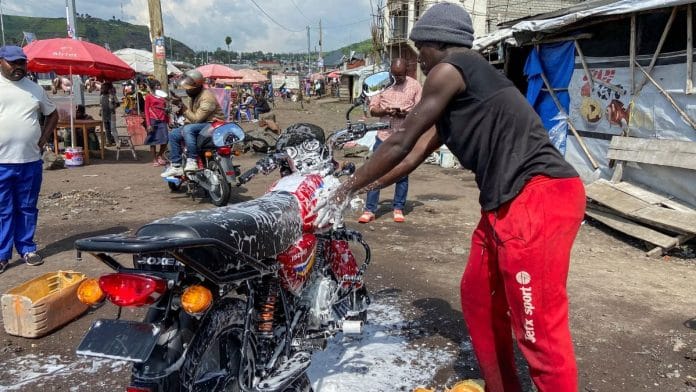Thank you dear subscribers, we are overwhelmed with your response.
Your Turn is a unique section from ThePrint featuring points of view from its subscribers. If you are a subscriber, have a point of view, please send it to us. If not, do subscribe here: https://englishdev.theprint.in/subscribe/
Our sustainable aspiration of Greening transportation is exploiting the miners in Congo, let us talk about the Cobalt used for EV batteries
In the pursuit of a sustainable future, the Congo finds itself at the heart of a paradox. Despite possessing more cobalt than all other nations combined, the citizens of Congo pay a significant price for this abundant resource—in the form of modern slavery. The demand for cobalt, a key metal in lithium-ion batteries used for electric vehicles (EVs), primarily driven by the goals of achieving sustainability, has created a market that exploits the poor and vulnerable labour force in the Congo. This exploitation not only perpetuates human rights abuses but also poses a moral dilemma for consumers who benefit from these products while indirectly supporting these unethical practices.
The global push for EV has gained momentum, with governments worldwide pushing for a shift away from internal combustion engine (ICE) vehicles. According to forecasts by Goldman Sachs Research, EV sales are projected to soar to about 73 million units in 2040, a significant increase from around 2 million in 2020. All these numbers point to the fact that the world’s appetite for this metal is only going to increase. However, beneath the surface of the environmental enthusiasm and sustainable future presented by the electrification of transportation lies an often-ignored truth about the human costs associated with this transition. This EV boom is fueled by the exploited labour in the supply chain.
Congo supplies over 70 percent of the world’s cobalt, a critical component in rechargeable batteries used worldwide, with mines there witnessing silent genocides. In his book ‘Cobalt Red: How the Blood of the Congo Powers Our Lives,’ the scholar on slavery, and an anti-slavery activist Siddhartha Kara, talked about how the majority of cobalt in the Congo is extracted by artisanal miners. These freelance workers, who are often children, extract cobalt under harsh conditions using basic tools.
The illegality of artisanal mining in the Congo persists for two main reasons. Firstly, poverty plagues the war-torn nation, leaving Congolese desperate for meagre wages, sometimes as low as a dollar or two per day. In the absence of enough opportunities, they willingly subject themselves to subhuman conditions at the mines. They continuously suffer at the hands of their oppressors with their settlements and villages bulldozed for cobalt mining, displacing thousands and eliminating alternative sources of livelihood. Secondly, companies exploit the situation to obtain raw materials at a very cheap price, boosting their profits across the supply chain.
This exploitation reflects historical patterns of resource exploitation in the Global South by technologically advanced rich nations, placing the pursuit of sustainability in a morally compromised position. The Congolese aren’t benefiting from the cobalt they extract; instead, it’s the companies.
The lack of strict regulations and oversight intensifies the situation, allowing companies to exploit the vulnerable population without any consequences. Additionally, the demand for cobalt batteries in electric vehicles continues to grow because of commitments towards combating climate change, further perpetuating the cycle of exploitation and endangering the lives of countless Congolese individuals. The companies fail to keep the supply chain free of human rights abuse despite their numerous promises and claims.
The prevailing discourse on techno-optimism and innovation, i.e., the view that when technology is combined with human passion and ingenuity, it can unlock a better world. However, it often neglects the violence and exploitation of the most downtrodden and vulnerable people occurring across the supply chain, particularly in the global south. Despite being equipped with cutting-edge technologies, the rich nations fail to provide basic protective gear for miners, violating labour laws and perpetuating a cycle of exploitation.
Siddhartha Kara mentions that rather than discarding cobalt completely, we should focus on fixing the supply chain. Recent international efforts have brought attention to the ethical concerns surrounding cobalt mining in Congo. Organisations and activists are advocating for increased transparency and ethical sourcing of cobalt in the supply chain. Initiatives like the Responsible Cobalt Initiative aim to address child labour and unsafe working conditions in cobalt mines.
Addressing the exploitation and human rights abuses in Congo’s mines is crucial for establishing fair trade practices, promoting economic development in local communities. Simultaneously, investing in research and development of alternative technologies, such as Iron-based batteries or solid-state batteries, and promoting responsible consumption can reduce our dependence on cobalt and other non-renewable resources. This multi-faceted approach contributes to a more equitable and sustainable global society. Furthermore, addressing ethical concerns surrounding cobalt mining involves recognising the need for fair labour practices and human rights protection. This recognition sets the foundation for creating policies and regulations prioritising the well-being of workers and local communities affected by mining operations.
Sanobar Imam is a Research Associate with CUTS International
These pieces are being published as they have been received – they have not been edited/fact-checked by ThePrint.


